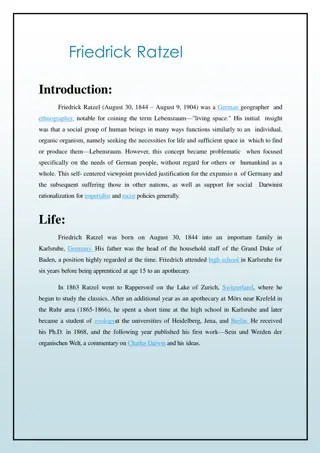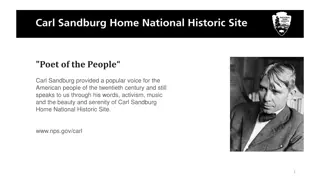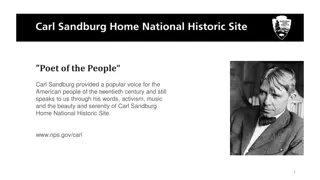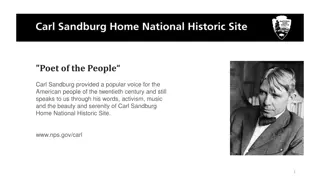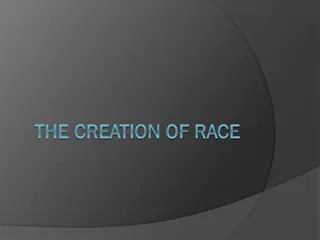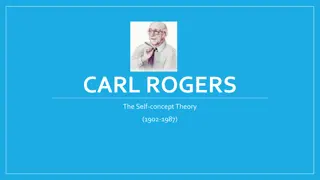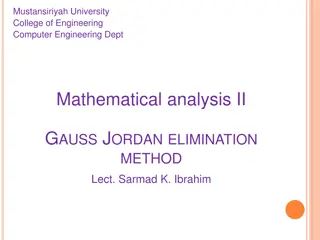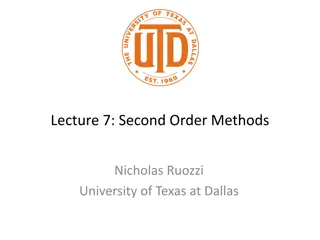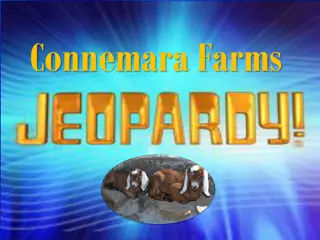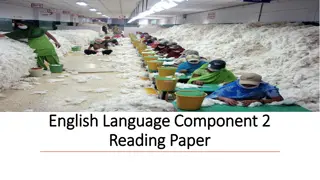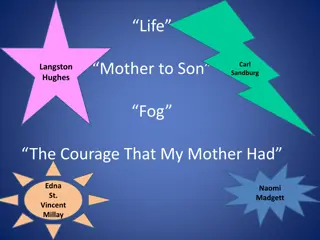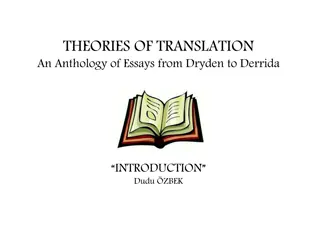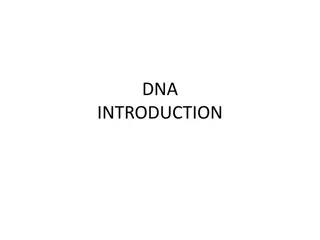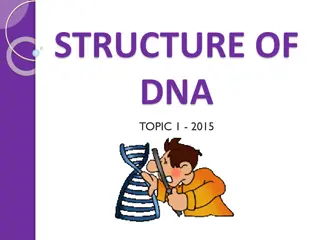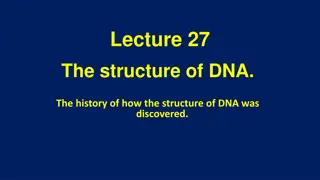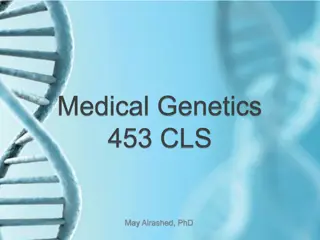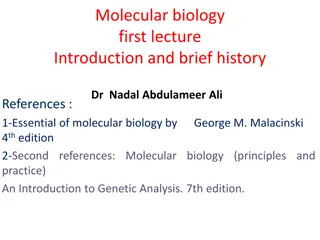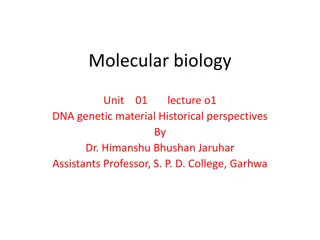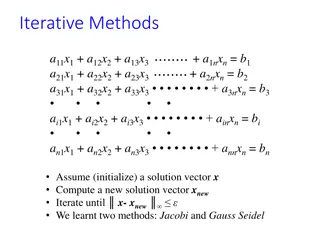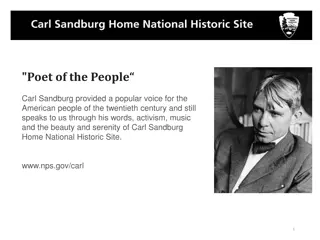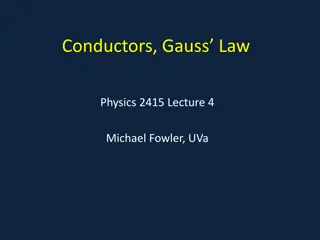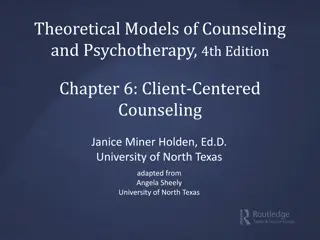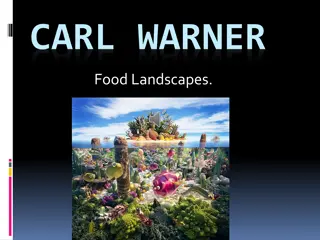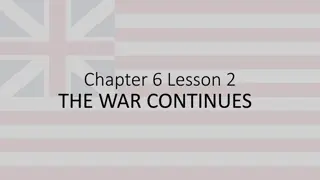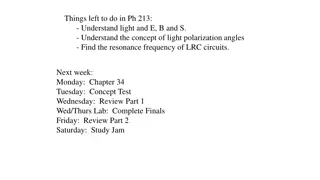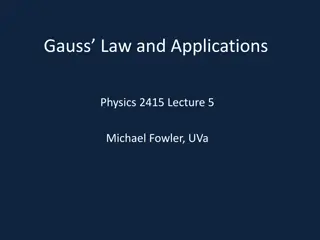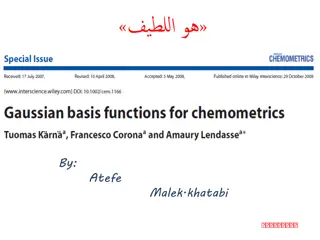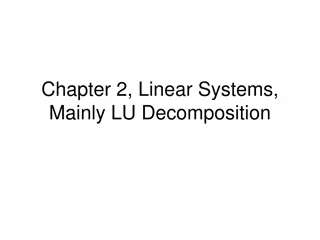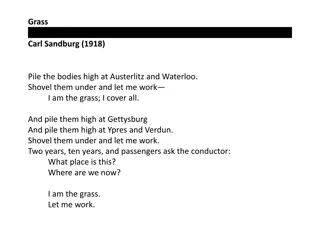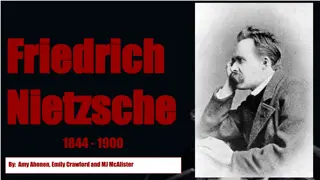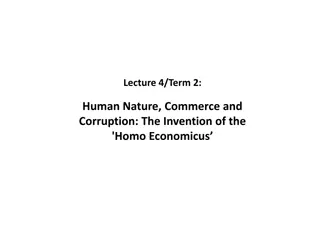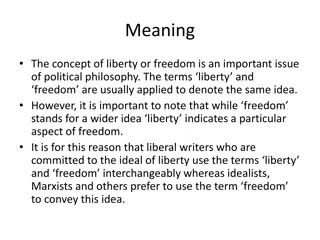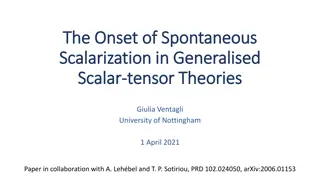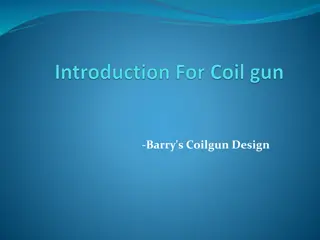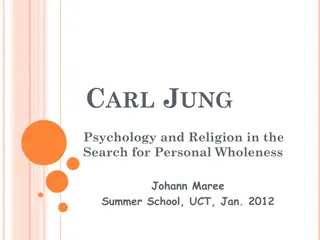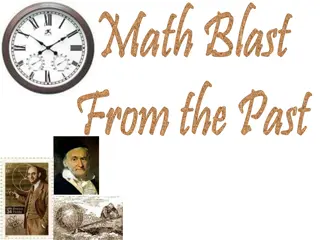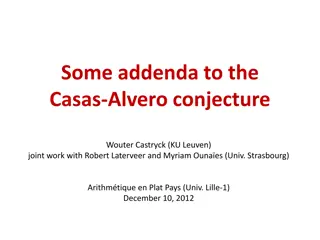Friedrich Ratzel: German Geographer and Ethnographer
Friedrich Ratzel, a prominent German geographer and ethnographer, introduced the concept of Lebensraum, emphasizing the importance of living space for social groups akin to organic organisms. His work was marked by a self-centered viewpoint that rationalized imperialist and racist policies. Ratzel's
0 views • 12 slides
Dive into Carl Sandburg's Poetry and Performance
Explore the essence of Carl Sandburg's poetry and the art of performance through engaging activities like watching videos, practicing poems, and channeling expression. Discover the beauty and significance of his words that resonate with the American people even today.
1 views • 7 slides
Carl Sandburg: Poet of the People and Biographer of Lincoln
Explore the legacy of Carl Sandburg, the Poet of the People in the 20th century, through his words, activism, and music. Discover his tribute to Abraham Lincoln and his biographical works. Dive into Sandburg's captivating storytelling of Lincoln's childhood and upbringing, reflecting on how he shape
0 views • 7 slides
Influential Voices: Carl Sandburg, Bob Dylan, and Songs of Social Justice
Explore the impact of poets like Carl Sandburg and musicians like Bob Dylan on society through their words, activism, and music. Discover how their works have influenced and been influenced by historic events, reflecting the dreams and struggles of the American people. Dive into the powerful message
3 views • 7 slides
Exploring the History of Race Classification and Racial Categories
Delve into the historical context of race classification through the lens of notable figures like David Hume and Johann Friedrich Blumenbach. Uncover the evolution of racial categories in U.S. Census data, from 1850 to 1930. Reflect on the implications of these classifications in society and learn a
0 views • 19 slides
Understanding Marxism and Capitalism
Marxism is a body of social, political, and economic thought derived from the works of Karl Marx and Friedrich Engels, focusing on the analysis of capitalism. Capitalism is an economic system where private individuals own goods and services based on market supply and demand. The purest form of capit
0 views • 25 slides
Carl Rogers and the Self-Concept Theory
Carl Rogers, a prominent figure in personality theory, emphasized individuals' constructive potential and the impact of their subjective experiences on personality development. He viewed individuals as goal-directed and capable of change, with the environment playing a facilitating or inhibiting rol
1 views • 78 slides
Understanding Gaussian Elimination Method in Linear Algebra
Gaussian Elimination and Gauss-Jordan Elimination are methods used in linear algebra to transform matrices into reduced row echelon form. Wilhelm Jordan and Clasen independently described Gauss-Jordan elimination in 1887. The process involves converting equations into augmented matrices, performing
4 views • 14 slides
Optimization Methods: Understanding Gradient Descent and Second Order Techniques
This content delves into the concepts of gradient descent and second-order methods in optimization. Gradient descent is a first-order method utilizing the first-order Taylor expansion, while second-order methods consider the first three terms of the multivariate Taylor series. Second-order methods l
0 views • 44 slides
Exploring Connemara Farms and Sandburg's Legacy
Dive into the world of Connemara Farms and the legacy of the Sandburg family. Visit the picturesque farm, learn about Carl Sandburg's writings, and uncover intriguing details about the family's life. From goats at Connemara to Carl Sandburg's literary works, this journey offers a unique blend of nat
0 views • 28 slides
Insights on Cotton Mills and Workers' Conditions in English Language Component 2 Reading Paper
The reading section of English Language Component 2 paper delves into the conditions of workers, particularly young girls, in cotton mills. Robin Pagna's article sheds light on the harsh reality faced by these workers, while Friedrich Engels' text provides further insight into the detrimental effect
1 views • 22 slides
Explore Poetry with Poets Langston Hughes, Edna St. Vincent Millay, Naomi Madgett, and Carl Sandburg
Delve into the world of poetry with renowned poets Langston Hughes, Edna St. Vincent Millay, Naomi Madgett, and Carl Sandburg. Discover the themes, structures, and figurative language in their works to enhance your appreciation for poetry.
1 views • 47 slides
Advanced Methods of Interpretation: Hermeneutics and Structuralism Lecture at Masaryk University
Understanding interpretation in cultural sociology through hermeneutics and structuralism is explored in Lecture III by Dr. Werner Binder at Masaryk University. The lecture delves into the art of interpretation, focusing on classical hermeneutics, Friedrich Schleiermacher's romantic hermeneutics, an
1 views • 37 slides
Overview of Translation Theories from Dryden to Derrida
The introduction of "Theories of Translation: An Anthology of Essays from Dryden to Derrida" offers a historical insight into translation theories. John Dryden emphasizes the importance of being proficient in both languages for translation. He categorizes translation into three types: metaphrase, pa
2 views • 25 slides
Understanding DNA: A Journey from Friedrich Miescher to Genes and Function
DNA, the hereditary basis of life, was first discovered by Friedrich Miescher in 1869. It consists of chromosomes, plasmids, and organellar DNA, collectively known as the genome. Genes, sequences of DNA, encode proteins and RNA, essential for an organism's functions. The genome is divided into chrom
0 views • 17 slides
Evolution of DNA Discovery and Understanding Through History
Delve into the captivating history of DNA, from its discovery by Friedrich Miescher in 1869 to the groundbreaking research of Rosalind Franklin in 1953. Follow the journey of scientific pioneers as they unraveled the mysteries of DNA's structure, composition, and role in genetic information transfer
0 views • 33 slides
The Fascinating History of DNA Structure Discovery
Delve into the historical journey of uncovering the structure of DNA, starting from Johann Friedrich Miescher's isolation of nuclein in 1869 to Phoebus Levene's identification of nucleotides in 1930. Learn about key contributors like Albrecht Kossel and the significant breakthroughs that paved the w
1 views • 36 slides
Evolutionary Contributions of Prominent Scientists in the 19th Century
Charles Darwin, Gregor Mendel, Friedrich Miescher, Aristotle, and Carl Linnaeus were key figures in the 19th century who made significant contributions to the fields of evolution, genetics, DNA discovery, and taxonomy. Darwin proposed the theory of evolution and natural selection, Mendel established
0 views • 20 slides
Introduction to Molecular Biology: Historical Insights and Key Experiments
Molecular biology is a field that focuses on understanding the behaviors of macromolecules like DNA, RNA, and proteins. This summary discusses the history of molecular biology, including the work of Friedrich Miescher and Griffith's experiment, which demonstrated the transfer of genetic material. Th
0 views • 19 slides
Historical Perspectives on DNA as Genetic Material: From Mendelism to Griffith's Experiment
Mendelism's rediscovery in 1900 laid the groundwork for understanding heredity, leading to the association of Mendel's factors with chromosomes. The quest to identify the chemical nature of heredity began with Friedrich Miescher's discovery of nucleic acid in 1869. Despite initial confusion between
0 views • 16 slides
Understanding Iterative Methods in Linear Algebra
Explore the concepts of iterative methods such as Jacobi and Gauss-Seidel for solving systems of linear equations iteratively. Understand conditions for convergence, rate of convergence, and ways to improve convergence speed. Delve into iterative schemes in matrix forms, convergence criteria, eigenv
0 views • 39 slides
Discovering Goat Care at Connemara Farms with Carl Sandburg
Explore the world of goat care at Connemara Farms through videos, stories, and poetry inspired by Carl Sandburg. Follow a ranger's responsibilities, experience a Five Senses Poem activity, and share your opinion on goat caregiving. Engage with the beauty and history of Carl Sandburg Home National Hi
0 views • 9 slides
Insights on Conductors and Gauss Law in Physics
Explore electric fields in and near conductors, understand Gauss Law, and delve into the behavior of electrons inside a conductor. Discover why there can be no electric field inside a conductor in electrostatics and learn about the distribution of charges on a conductor's surface. Consider scenarios
4 views • 19 slides
Understanding Carl Rogers' Client-Centered Counseling Approach
Explore the historical overview, philosophical underpinnings, and personality development principles of Carl Rogers' client-centered counseling approach. Learn about Rogers' development of theory, his philosophical influences like phenomenology and existentialism, and key concepts such as actualizin
0 views • 23 slides
Explore the Unique Food Landscapes of Carl Warner
Discover the fascinating work of artist Carl Warner, known for creating intricate landscapes using only food items. From Mushroom Pit to Meat Waterfall, each masterpiece is meticulously crafted, photographed, and labeled alphabetically. Explore how Carl's art transforms everyday ingredients into stu
0 views • 6 slides
The Continued Struggle and Foreign Support in the American Revolution
The American Revolution persisted with the support of allies like France and Spain, as well as key foreign figures such as Marquis de Lafayette and Friedrich von Steuben. Despite facing hardships like the harsh winter at Valley Forge and financial struggles, the Americans persevered with the aid of
0 views • 6 slides
Understanding E and B Fields in Physics 213
Explore concepts such as light polarization angles, resonance frequency of LRC circuits, Lorentz Force Law, Gauss Law, Faraday's Law, and Ampere-Maxwell Law in Physics 213. Delve into the interplay between electric and magnetic fields, and their effects on charged particles such as electrons and pro
0 views • 19 slides
Understanding Gauss Law and Its Applications in Physics 2415
Explore Gauss Law and its applications in physics, including systems with spherical symmetry, cylindrical systems like coaxial cable, and flat plates. Learn about electric field lines behavior near charges and conducting surfaces, as well as dipole field lines in 3D. Discover analogies with fluid fl
0 views • 29 slides
Functional Approximation Using Gaussian Basis Functions for Dimensionality Reduction
This paper proposes a method for dimensionality reduction based on functional approximation using Gaussian basis functions. Nonlinear Gauss weights are utilized to train a least squares support vector machine (LS-SVM) model, with further variable selection using forward-backward methodology. The met
0 views • 23 slides
Understanding Linear Systems and LU Decomposition
Explore the fundamental concepts of linear algebra, including matrix notation, existence of solutions, vector spaces, computation tasks, and LU decomposition techniques. Learn about Gauss elimination, Crout's algorithm, and how to solve linear systems efficiently using LU decomposition.
0 views • 25 slides
Friedrich Nietzsche's Genealogy of Morals: Uncovering the Evolution of Moral Values
Friedrich Nietzsche critiques traditional philosophy for overlooking the historical development of moral concepts. He argues that moral judgments were initially based on strength and power, later evolving into the dichotomy of master and slave morality. By tracing the genealogy of moral terms, Nietz
0 views • 10 slides
Tragic Tale of War and Grass in Carl Sandburg's Poem
Carl Sandburg's poem "Grass" reflects on the gruesome aftermath of wars like Austerlitz, Waterloo, Gettysburg, Ypres, and Verdun, with the grass personified as a silent witness covering the piled bodies. The poem hauntingly portrays the destruction and loss during the war, emphasizing the cyclical n
0 views • 4 slides
Friedrich Nietzsche - Philosopher and Thinker Extraordinaire
Friedrich Nietzsche, a renowned German philosopher, cultural critic, and essayist, challenged traditional Western morality and Christian beliefs. He advocated for personal reflection in philosophy, rejected societal norms, and introduced existentialist ideas that emphasized individual freedom and re
0 views • 10 slides
The Evolution of Liberal Economic Thought: Friedrich Hayek and Adam Smith
The lecture delves into the concept of 'Homo Economicus' and the ideas of Friedrich Hayek and Adam Smith regarding individualism, liberalism, and economic freedom. It discusses how Hayek praised Smith's contribution to liberalism and the significance of securing individual freedom. The Acts of Union
0 views • 20 slides
Exploring the Concept of Freedom and Liberty in Political Philosophy
The concept of liberty and freedom holds significant importance in political philosophy. While often used interchangeably, liberty signifies a specific aspect of freedom. Freedom encompasses the quality and condition of human beings, distinguishing them from other living beings. It involves the cont
0 views • 13 slides
Understanding Spontaneous Scalarization in Gravitational Theories
Spontaneous scalarization presents a unique phenomenon where compact objects experience field growth triggered by tachyonic instability, leading to stable field configurations. Explored in various theories, such as Horndeski gravity and scalar Gauss-Bonnet gravity, spontaneous scalarization is studi
0 views • 18 slides
Understanding Coilguns: A Comprehensive Overview of Coilgun Design and Operation
Coilguns, also known as Gauss guns, accelerate pieces of iron or steel using electromagnetic coils, creating a powerful magnetic field. This overview covers the principles behind coilguns, including magnetic materials, solenoid physics, energy storage in capacitors, and the role of inductors in damp
0 views • 26 slides
Understanding Carl Jung's Analytical Psychology and Relationship with Freud
Providing insights into Carl Jung's life and analytical psychology, including his challenging relationship with Freud as well as key concepts like the sexual instinct and libido. Explore Jung's evolving ideas that formed the basis for his search for personal wholeness through psychology and religion
0 views • 35 slides
The Remarkable Life and Legacy of Mathematician Carl Friedrich Gauss
Carl Friedrich Gauss was a prodigy who made significant contributions to mathematics at a very young age. He famously solved the problem of adding numbers from 1 to 100 quickly by recognizing a pattern. Despite personal tragedies, including the loss of his first wife and child, Gauss continued to ex
0 views • 15 slides
Addenda to Casas-Alvero Conjecture: Polynomial Derivatives and Common Roots.
In this research work, the Casas-Alvero conjecture is explored, focusing on polynomials and their derivatives, and the common roots they share. The study delves into the normalization of roots under various transformations, using p-adic methods and Gröbner bases. Noteworthy findings include implica
0 views • 24 slides
